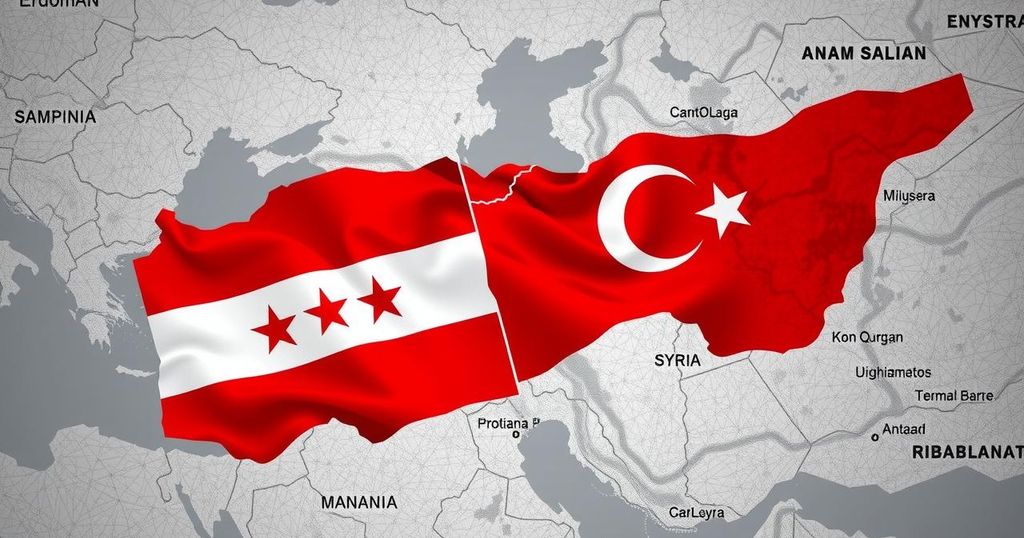Turkey’s Strategic Emergence in Post-Assad Syria
Turkey has solidified its diplomatic presence in Syria following Assad’s fall, utilizing recent developments to enhance its influence and address domestic issues related to Syrian refugees. Erdoğan’s adaptable strategies highlight Turkey’s growing role in reconstruction and regional governance, while HTS’s alignment with Ankara alters the dynamics within northern Syria.
In the aftermath of former Syrian President Bashar al-Assad’s departure to Moscow, Turkey formally raised its flag over its embassy in Damascus for the first time in twelve years, marking a significant diplomatic milestone. Turkish intelligence chief Ibrahim Kalin’s visit to the Syrian capital, which was characterized as a “victory lap” by observers, demonstrates Ankara’s elevated status following the regime’s fall. This new dynamic has provided Turkey with fresh opportunities regarding its influence in Syrian power struggles, particularly in Kurdish regions, as Erdoğan asserts his diplomatic stance.
As conflict escalated in Syria, Ankara maneuvered with caution, delaying military interventions from its allied militant group HTS, instead strategizing to bring Assad to negotiations along with Russian and Iranian allies. However, Assad’s rejection of Erdoğan’s overtures and continued military actions against HTS solidified Ankara’s response to recognize the insurgent group’s capabilities, ultimately leading to Turkey endorsing HTS’s military strategies.
Amidst the combat, Erdoğan expressed unwavering support for Syrian opposition progress, which he perceived as a significant opportunity for both Turkish foreign policy and internal dynamics, where he aims to balance public favor regarding Syrian refugees against nationalist sentiments for repatriation. Turkey’s foreign minister subsequently emphasized this dual approach, asserting intentions for Syrian individuals to return post-Assad, while Turkish construction companies prepared for reconstruction efforts in Syria, suggesting an optimistic economic future.
As Ankara’s strategic foothold in Syria strengthens, Turkish-backed factions are increasingly expanding their regions of control at the expense of U.S.-supported Kurdish forces. This evolution illustrates a reshaping of geopolitical alliances and control amid the Syrian conflict, showcasing Turkey’s ability to capitalize on the new political landscape. Turkish officials assure their focus remains on ensuring no autonomous Kurdish authority develops within Syria’s Northeast, while HTS seeks Turkish collaboration for legitimacy on the world stage. Thus, Turkey emerges influential in post-Assad Syria, affirming its pivotal role in the region’s geopolitical strategy and reconstruction efforts.
Turkey has long been integrally involved in the Syrian conflict, initially supporting opposition forces against the Assad regime while also managing significant domestic concerns regarding the influx of Syrian refugees. The recent political changes in Syria following Assad’s exit provide a backdrop for Turkey’s evolving presence in the region, with increasing efforts to rebuild relationships and assert dominance in the politically fragmented landscape. Turkey’s balancing act involves catering to nationalist sentiments domestically while positioning itself as a leader among Muslim nations.
In conclusion, Turkey has adeptly navigated the shifting tides of Syrian politics following the ousting of Assad. Erdoğan’s strategies reflect a calculated approach to enhance Turkey’s influence while addressing domestic challenges surrounding Syrian refugees. With HTS’s empowered position, Turkey stands prepared to forge ahead in reconstruction efforts and solidify its geopolitical stature in the ongoing Syrian landscape.
Original Source: www.theguardian.com




Post Comment